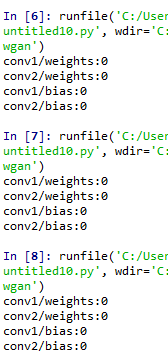【TensorFlow】tf.reset_default_graph()函数
转载 https://blog.csdn.net/duanlianvip/article/details/98626111
tf.reset_default_graph函数用于清除默认图形堆栈并重置全局默认图形。
1、无tf.reset_default_graph
import tensorflow as tf # 执行完 with 里边的语句之后,这个 conv1/ 和 conv2/ 空间还是在内存中的。这时候如果再次执行此代码,就会再生成其他命名空间 with tf.name_scope('conv1') as scope: weights1 = tf.Variable([1.0, 2.0], name='weights') bias1 = tf.Variable([0.3], name='bias') # 下面是在另外一个命名空间来定义变量的 with tf.name_scope('conv2') as scope: weights2 = tf.Variable([4.0, 2.0], name='weights') bias2 = tf.Variable([0.33], name='bias') # 所以,实际上weights1 和 weights2 这两个引用名指向了不同的空间,不会冲突 print(weights1.name) print(weights2.name) print(bias1.name) print(bias2.name)

在再次执行的过程中,都会在上一次执行的基础生成新的张量。
2、有 tf.reset_default_graph()
import tensorflow as tf tf.reset_default_graph() # 执行完 with 里边的语句之后,这个 conv1/ 和 conv2/ 空间还是在内存中的。这时候如果再次执行此代码,就会再生成其他命名空间 with tf.name_scope('conv1') as scope: weights1 = tf.Variable([1.0, 2.0], name='weights') bias1 = tf.Variable([0.3], name='bias') # 下面是在另外一个命名空间来定义变量的 with tf.name_scope('conv2') as scope: weights2 = tf.Variable([4.0, 2.0], name='weights') bias2 = tf.Variable([0.33], name='bias') # 所以,实际上weights1 和 weights2 这两个引用名指向了不同的空间,不会冲突 print(weights1.name) print(weights2.name) print(bias1.name) print(bias2.name)

无论执行多少次生成的张量始终不变。换句话说就是:tf.reset_default_graph函数用于清除默认图形堆栈并重置全局默认图形。


